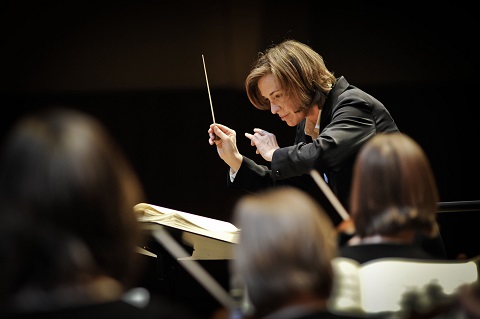 United Kingdom Mendelssohn: Rowan Pierce (soprano), Jessica Gillingwater (mezzo), Hilary Summers (contralto), Martin Mitterrutzner (tenor), Huw Montague Rendall (baritone), SCO Chorus, Scottish Chamber Orchestra / Laurence Equilbey (conductor), Queen’s Hall, Edinburgh, 29.11.2018. (SRT)
United Kingdom Mendelssohn: Rowan Pierce (soprano), Jessica Gillingwater (mezzo), Hilary Summers (contralto), Martin Mitterrutzner (tenor), Huw Montague Rendall (baritone), SCO Chorus, Scottish Chamber Orchestra / Laurence Equilbey (conductor), Queen’s Hall, Edinburgh, 29.11.2018. (SRT)

Mendelssohn – Overture and Incidental Music to A Midsummer Night’s Dream; Die erste Walpurgisnacht
As icy rain beats down outside and an unforgiving Caledonian wind whips around Edinburgh, we are about as far away from Midsummer as it is possible to get. That surely makes it the most inviting time imaginable for settling into a performance of Mendelssohn glorious music for Shakespeare’s Midsummer Night’s Dream, especially when our guides were the Scottish Chamber Orchestra led by the chic elegance of Laurence Equilbey.
Yet this Dream felt rather earthbound, even slightly unbalanced in places, and it took a while to settle into its stride. That’s at least in part due to the fact that the Queen’s Hall acoustic really doesn’t flatter the SCO when they have to accommodate their chorus as well. Squeezing the chorus onto the stage means that the orchestra gets pushed further into the audience, even with several rows of stalls removed, which presses the sound right against the eardrum in a way that can make you wince if you are not prepared. Throw in a contingent of brass to go with the timps and the effect comes close to being vulgar at times.
So it is hardly the orchestra’s fault that the first tutti of the Overture actually sounded pretty ugly, and it wasn’t until the Wedding March that Equilbey seemed to manage to tailor the full sound appropriately. That might also explain why the winds, who made a tentative start to the overture, sounded delightfully tripping at the top of the Scherzo, but the strings and brass had elements of clodhopping. The SCO is currently at the start of the (long) process of building a new hall in St Andrew’s Square. Concerts like this make me think it cannot come quickly enough.
On the positive side, however, Equilbey’s period inflection of the string sound, with only a little vibrato, gave a hard edge to the fairy music but suited the febrile atmosphere of the intermezzo and added extra spice to Bottom’s braying. There was swagger to the Mechanicals’ music too, but the highlight came with a lovely Nocturne, crowned by a beautifully played horn solo from guest principal Hugh Sisley.
The ladies of the chorus made a beautifully cohesive sound for the two songs, over which hovered the mezzo of Jessica Gillingwater and, even finer, the glorious soprano of Rowan Pierce, a real star in the making.
But this was a mere warm up for what the chorus would need to sing after the interval. These three weeks sees the SCO embarking on a mini Mendelssohn festival, and they have raked up the rarity of Die Erste Walpurgisnacht for an unusual treat. Walpurgisnacht (30 April) is Germany’s celebration of witchcraft and wizardry, and it is no coincidence that it occurs exactly half a year away from our Halloween. Goethe’s poem, on which Mendelssohn based his setting, isn’t so much about witches, however. Rather than a Berliozian Witches’ Sabbath, Goethe celebrates the ancient druids whose ceremonies were on the brink of being stamped out by militant Christians, giving us a multi-faith celebration of divinity rather than one marked by orthodox religion.
It is hokum dressed up as nonsense, but it contains some fun choral moments, including one where the druids dress up as devils to scare off the Christians, as well as a pantheistic hymn of praise at the end. The SCO Chorus loved every minute, singing the difficult contrapuntal writing with flair and panache, making me think yet again of how much they have come on under their director, Gregory Batsleer. The trio of soloists was great, too, from the deep contralto of Hilary Summers to the light, honeyed tenor of Martin Mitterrutzner. Finest of all, though, was the rich, dramatic baritone of Huw Montague Rendall, who sang with all the authority of a Wotan in training, but who was still unafraid to rein it in to give some moments of beautiful subtlety when required. Even the Queen’s Hall acoustic couldn’t mask the fact that these were two star-quality singers in one night.
Simon Thompson